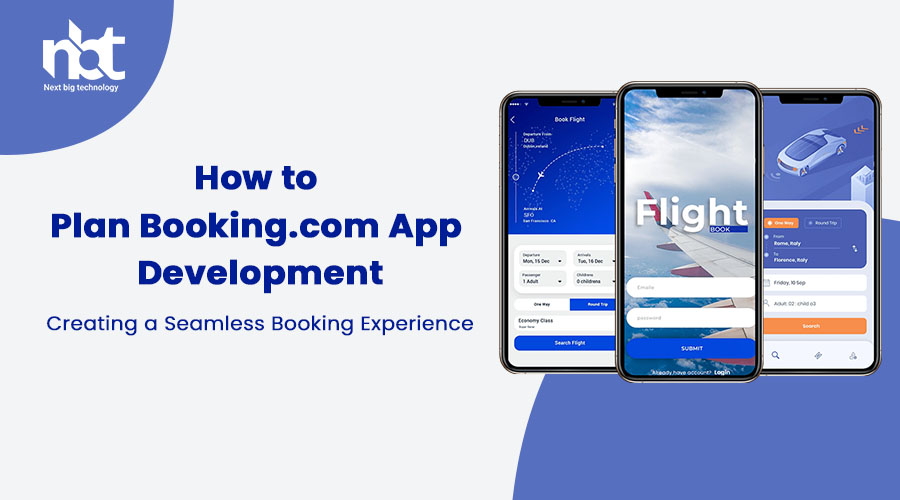Introduction:
Booking.com has revolutionized the travel industry by providing a user-friendly platform for booking accommodations, flights, and other travel-related services. If you’re looking to develop a similar app, this comprehensive guide will walk you through the key steps and considerations for planning your Booking.com app development. From understanding the features of the app to determining the technology stack and designing a seamless user experience, let’s dive in and create a remarkable booking platform.
I. Understanding Booking.com App Development:
- Overview of Booking.com:
- Booking.com is a popular online travel agency that connects travelers with accommodations, flights, car rentals, and more. The app provides a vast inventory of options, competitive prices, and a seamless booking experience.
- Key Features of the Booking.com App:
- Accommodation Search: Users can search for accommodations based on location, dates, and preferences such as price, amenities, and user ratings.
- Flight and Car Rental Booking: The app allows users to search for and book flights and car rentals to create comprehensive travel itineraries.
- Reviews and Ratings: Users can read reviews and ratings from other travelers to make informed decisions about their bookings.
- Booking Management: The app provides users with a centralized platform to manage their bookings, including modifications, cancellations, and access to booking details.
- Personalization: Booking.com offers personalized recommendations and deals based on user preferences and booking history.
- Secure Payments: The app ensures secure payment processing for bookings, supporting various payment methods.
- Multilingual Support: Booking.com supports multiple languages to cater to a global user base.
- Customer Support: The app provides customer support channels to assist users with their inquiries, changes, or issues related to their bookings.
II. Planning the Booking.com App Development:
- Define Your App’s Objectives:
- Determine the primary goals and target audience for your booking app. Identify what sets your app apart from Booking.com and the unique value proposition you offer.
- Market Research and Analysis:
- Conduct thorough market research to understand the competitive landscape, user preferences, and emerging trends in the travel industry. Identify opportunities to differentiate your app.
- Technology Stack:
- Choose the appropriate technology stack for your app, including front-end and back-end development frameworks, programming languages, and database systems. Consider scalability and performance requirements.
- User Experience (UX) Design:
- Create wireframes and design mockups to define the user flow, information architecture, and visual design of your app. Focus on intuitive navigation, efficient search capabilities, and clear booking processes.
- Front-End Development:
- Develop the front-end of your app using the chosen technology stack. Implement features such as accommodation search, flight and car rental booking, user authentication, and booking management.
- Back-End Development:
- Set up the server-side infrastructure and APIs required to handle search requests, data storage, booking management, payment processing, and integration with third-party travel providers.
- Content and Data Integration:
- Integrate APIs or establish partnerships with accommodation providers, flight aggregators, and car rental services to ensure a comprehensive and up-to-date inventory of options.
- Personalization and Recommendations:
- Implement algorithms and data analytics to personalize user experiences, provide relevant recommendations, and offer personalized deals based on user preferences and behavior.
- Payment Integration and Security:
- Integrate secure payment gateways to facilitate seamless and secure transactions. Implement robust security measures to protect user data and comply with industry standards.
- Testing and Quality Assurance:
- Conduct comprehensive testing to ensure the app’s functionality, usability, and performance. Test across different devices, operating systems, and network conditions.
- Deployment and Launch:
- Deploy your app to the respective app stores (App Store and Google Play Store) and make it available for users to download and install. Plan a marketing strategy to promote your app and attract users.
III. Conclusion:
Planning the development of a booking app like Booking.com requires careful consideration of user experience, technology stack, and integration with travel providers. By following the steps outlined in this guide, you can create a remarkable platform that enables users to find and book accommodations, flights, and other travel services with ease. Remember to prioritize intuitive user interfaces, robust back-end systems, and personalized experiences to stand out in the competitive travel industry. Embrace the power of Booking.com app development and create a seamless booking experience for travelers worldwide.










